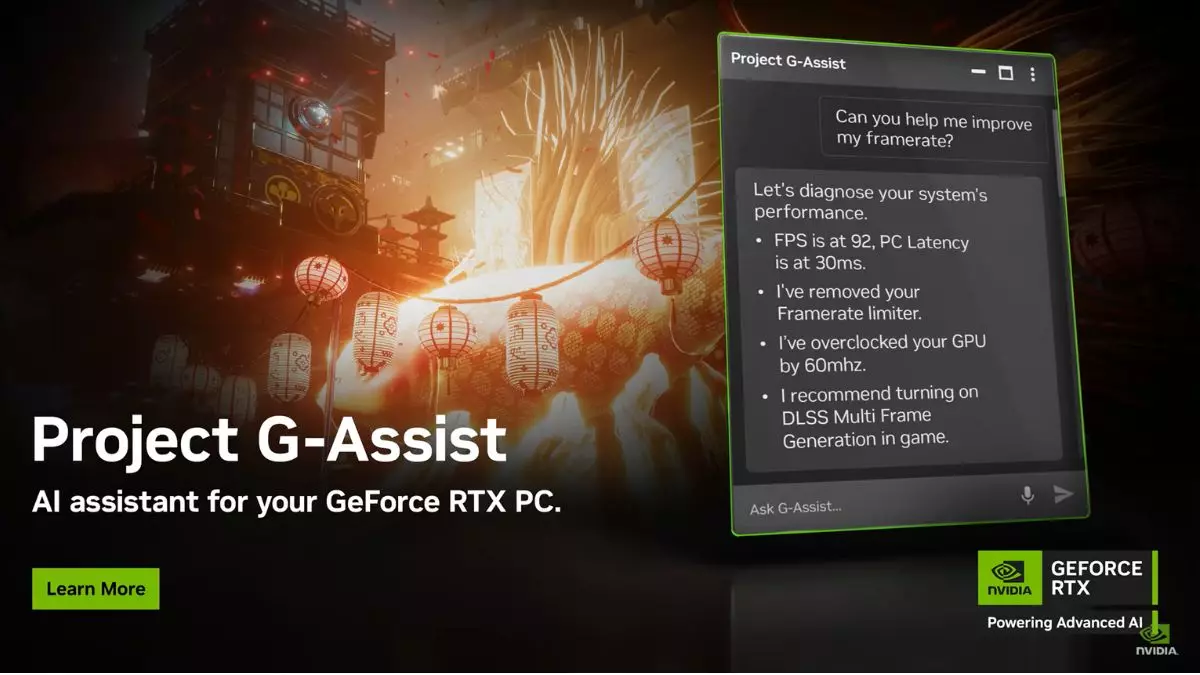On a pivotal Tuesday, Nvidia unveiled a revolutionary product—Project G-Assist—a local AI assistant that has the potential to alter the gaming experience for die-hard GeForce RTX GPU enthusiasts. This local application launches the era of personalized AI in gaming, a shift that could redefine engagement and interactivity for players. By bringing AI functionalities right to the desktop PC without relying on cloud technology, Nvidia is not only placing user privacy at the forefront, but also enhancing the gaming experience with real-time, efficient responses.
Local AI: A Bold Step Toward User Empowerment
What stands out about G-Assist is its local deployment, effectively reducing data privacy concerns inherent in cloud-based applications. In an age where personal data is an increasingly valuable currency, the launch of a local AI assistant that keeps user information on-device is a commendable leap forward. By prioritizing privacy, Nvidia resonates with a significant segment of gamers who are weary of intrusive data tracking. Users can tap into the power of an AI that understands their needs without compromising their data.
However, while Nvidia embraces this forward-thinking approach, it’s crucial to note that the current version is experimental and only supports desktop PCs, leaving laptop users on the sidelines. This might alienate a sizable demographic of gamers who rely on portability. The lack of broad applicability could hinder widespread adoption initially and may require Nvidia to reconsider its approach to user inclusivity.
Game Optimization Meets Real-time Performance Monitoring
The heart of G-Assist lies in its functionality, boasting capabilities from optimizing in-game settings to running real-time diagnostics—a feature that could dramatically alter how players interact with their gaming rigs. Imagine discussing strategies or examining your last match replay with an AI that can actually improve your skills based on the analysis. This drives the concept of iterative improvement, allowing players to evolve continuously—a compelling incentive for serious gamers.
Yet, there’s an undercurrent of caution here; will the AI’s recommendations always enhance actual gameplay? The succeeding user experience will heavily depend on the accuracy of the small language model powering G-Assist. G-Assist’s dependence on its tuned model could risk user disappointment if its recommendations prove ineffective in real-world scenarios. The balance of an AI’s optimizing superpower against the human touch in gaming remains to be seen.
Caught Between Impressive Features and Over-Dependence
It is undeniably impressive that G-Assist can manage complex tasks like GPU overclocking and power efficiency adjustments. However, one must muse about the consequences of over-reliance on AI. Gamers may come to depend heavily on G-Assist, potentially stunting natural skill development or the intuitive understanding that comes from trial and error. This presents a philosophical dilemma about the role technology should play in enhancing the human experience—it’s a double-edged sword.
As Nvidia balances these issues, it will be interesting to see how they respond to potential criticism regarding skill dilution while emphasizing gaming innovation. In an age where authentic skill Development should still be celebrated, finding the right balance will be key to the sustained success of G-Assist.
Nvidia charts a bold course amid a constantly evolving tech landscape, pushing the envelope toward a gaming future brimming with possibilities while also stirring necessary conversations about privacy, dependency, and the preservation of natural skill development in a tech-driven world.


Leave a Reply